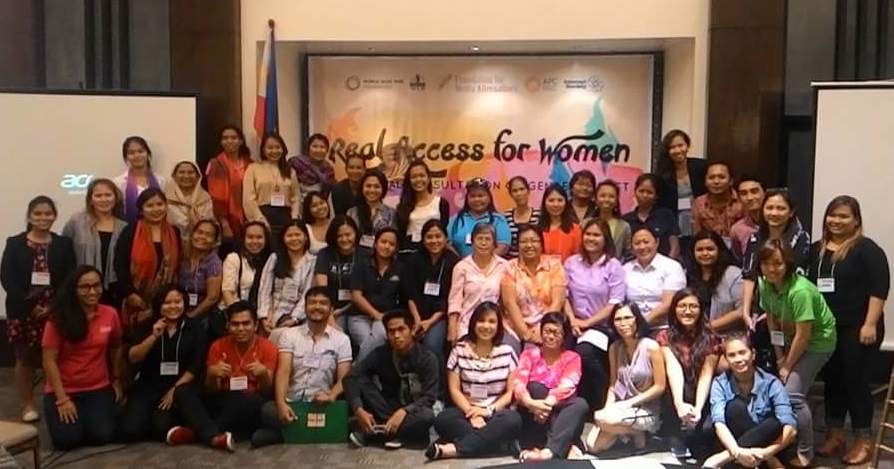Last month at the United Nations in New York, world leaders agreed on 17 Sustainable Development Goals which countries must strive to carry out in the next 15 years. Like its predecessor, the 3rd MDG, the 5th SGD aims to achieve gender equality worldwide through an extensive list of targets, and this time with an explicit pledge to harness ICT use to empower women.
The Philippines is well positioned to lead the charge towards a more gender-equal Internet in the Asia-Pacific region. It has long been one of the most gender-equal nations in the world, and the only one in Asia-Pacific to consistently rank among the top 10 countries with the least gender disparity, according to the World Economic Forum. Significantly, it is one of the very few countries in the region where women have equal, or close to equal, participation in the technical and scientific fields, and where women outnumber men—albeit just marginally—in having access to the Internet.
But the Philippines is also home to a significant number of people for whom ICT adoption is not an immediate priority. A quarter of the population lives below the poverty line, with some 70% of women estimated to be in a state of survival. Last week, a national consultation held by the Foundation of Media Alternatives and supported by the Internet Society showed that just as the Internet promises to help uplift women’s lives, it may also exacerbate or even create new forms of socio-economic inequalities, even among women themselves.
While urban-based participants at the two-day workshop noted the barriers posed by the country’s slow and expensive Internet, those from Magindanao, a culture-rich but conflict-ridden area in southern Philippines, spoke of a complex array of restrictions standing in the way of increased ICT use. Lack of power in many villages mean that women need to walk for hours to the nearest town to charge their mobile phones, while periodic evacuations due to ongoing clashes have created communities that are always on the move, settling in makeshift structures, thus making it difficult to equip schools, for instance, with computers and Internet connectivity.
Where there is Internet access, some have observed a general discomfort with unfamiliar technology, especially among rural residents. One woman said that in her village, elderly midwives find it more challenging to transition to writing their reports online, and tend to revert back to using paper once the connectivity cuts off. Another shared that locals are hesitant to try a peculiar-looking device, even if it is meant for public use, without someone first teaching them how it works.
Such stories highlight the importance of integrating digital literacy training with Internet connectivity provision. In low-income areas where women are more prone to sexual exploitation and trafficking, rights groups worry that women may be learning to use the Internet for purposes that make them more vulnerable to online and offline abuse. Digital skills training must thus not only be about how one can connect to the Internet, but also include ways by which women can use it productively for self-development.
In a study conducted by Google, women in the Philippines cited lack of time, skills and income as the biggest obstacles to Internet use. It also found the community as the most trusted source of Internet knowledge among women, with 74% preferring to receive instructions from friends and family, over say, a formal course in a group setting. This means that not only must policies promote alternative and more affordable modes of Internet access but also flexible approaches to education and learning, such as train the trainer sessions for women owners of coin-operated Internet kiosks or mobile phone credit resellers, who could more easily pass the knowledge on to their customers and acquaintances.
The Philippine government’s Tech4Ed programme, to be deployed alongside its free Wi-Fi project, promises to provide practical digital skills training particularly to out of school youth, senior citizens, women and indigenous people across the country. But while women in the country continue to advocate for gender mainstreaming in national policy, many of the solutions sought at the workshop were aimed at a more localised level, from new ordinances to curtail cyber prostitution to cultivating more technical knowledge in remote villages to enable them to build their own wireless networks. Others are pushing for a portion of the budget given to barangays, the smallest unit of governance in the Philippines, to be allotted to hands-on digital skills training for women and girls.
To bring more women online, it is crucial to first identify the groups and sectors who continue to be offline. And from last week’s consultation, it is becoming clearer that the next wave of initiatives to extend Internet access must be targeted to, as a Web Foundation executive put it, those without the status or power to claim it. For countries like the Philippines, this means women with disabilities, those in rural areas, informal sector workers, the urban poor, and members of indigenous communities.

